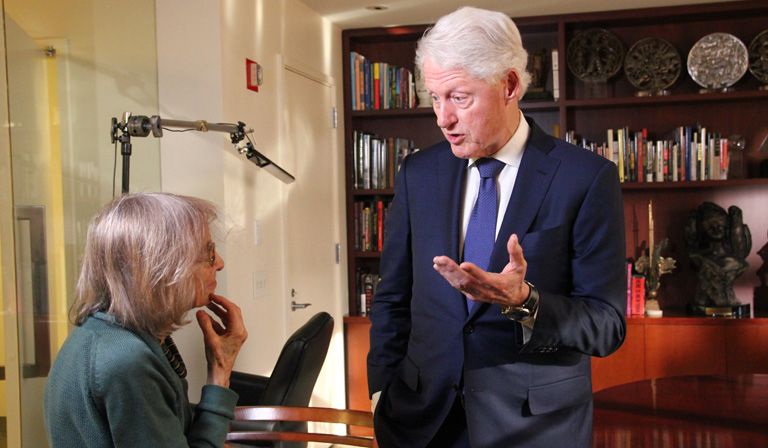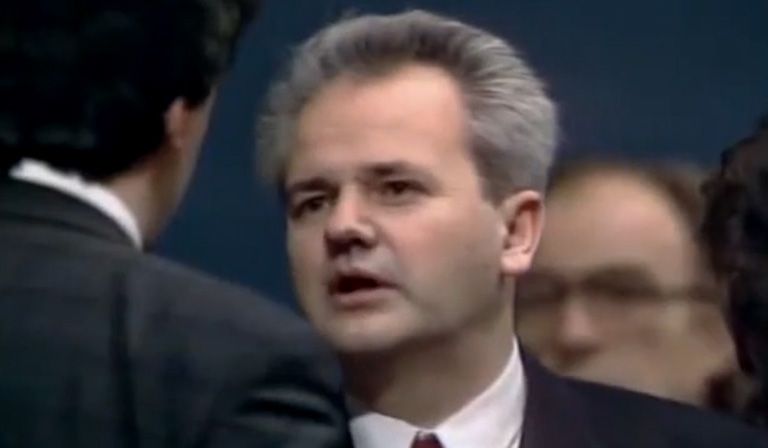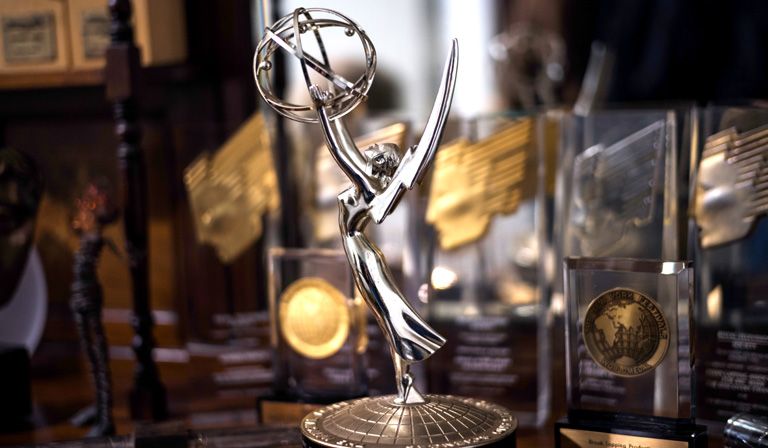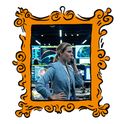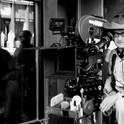People often tell the documentary filmmaker Norma Percy that her long track record of interviewing world leaders must mean she can easily convince them to speak with her again. But, she says, you never know what someone’s circumstances are at any given moment: “You have to start from scratch each time.” That’s why, at 81 and after almost 40 years of making landmark documentary series about the great historical events of our times, Percy still pores over every interview request. (“It probably drives my colleagues crazy,” she laughs).
When I arrive at her home—a spacious townhouse on a verdant square in north London—she is hunched over her desk, glasses on, correcting letters for prospective contributors ahead of a research trip to the US. Percy sees this step as integral. “We write long letters that describe what we’re trying to do: to get inside the room where the decisions are made, so that the viewers can understand the pressures that they’re under. Most politicians do things for good reasons. And if you convince them that you’re going to be fair to them, they want to tell their story.”
Percy’s broad-ranging, agenda-setting films span time and continents, covering the key conflicts and political turning points of the modern era. A 2009 Guardian editorial said: “Every significant international story seems to have its Percy film.” Back in 1995, a BBC policy statement described the shows that she made with her collaborator Brian Lapping as “a new genre of documentary which retells momentous events with meticulous objectivity”. To name but a few, their series have included The Second Russian Revolution (1991), which gave an extraordinarily up-close view of Glasnost and the fall of the Soviet Union; The Death of Yugoslavia (1995–96) and The Fall of Milošević (2001), which depicted the Yugoslav wars and their aftermath through the eyes of Serbian, Bosnian and Croatian leaders. More recently, Inside Obama’s White House (2016) and Trump Takes on the World (2021) have given an intimate view of the workings of power in the US, while Putin vs the West (2023) depicted Russia’s shifting role on the world stage and the chilling march towards war in Ukraine. In between have been series on everything from the peace process in Northern Ireland to Iran’s troubled relationship with the west, from Watergate to Cuba. But although she is renowned within the TV industry, Percy is not a household name.
Tiny in stature, elegant and well-groomed, Percy has a ready smile and an endless supply of astonishing stories about her interactions with famous politicians. She speaks with an air of amused delight, almost sounding surprised at the life she’s lived and the people she has sat down with—from Bill Clinton, Mikhail Gorbachev, Slobodan Milošević and Tony Blair to the countless advisers, negotiators and officials whose names you might not know but who helped shape recent history.
Immersing yourself in Percy’s documentaries, as I recently did, you start to understand why she is so focused on securing access. “Our aim is always to show people what it was like inside the room,” she says. “We say to them: just tell me what happened.” But although Percy often jokes that “people hire me when they want to get everyone”, the films do not work solely because of the characters who feature. Part of her skill is in identifying inflection points—the meetings that led to other meetings that led in turn to world-changing decisions. “People don’t talk so much about the storytelling aspect, and just how good Norma is at crafting a story,” says Tim Stirzaker, who started working with Percy as a researcher in 2008 and has been the series director on her last three projects.
We’re so used to hearing politicians obfuscate and repeat practised lines that it is disarming to hear these familiar voices sharing intimate, human insight into the sometimes-mundane factors that influence how decisions are made—the personality clashes and the delirious all-night conferences. Interviews are cut together with news archive footage, giving a vivid, three-dimensional snapshot of how things happened. In one extraordinary scene from the 2001 series Endgame in Ireland, news footage of loyalist sniper Michael Stone attempting to assassinate Gerry Adams and Martin McGuinness as they attended an IRA funeral is intercut with interviews with Adams, McGuinness and Stone describing what they saw and felt.
Percy has been making series in this style since the 1980s, following the same strict method even as the media and political landscape has transformed, moving from an age where there was only a handful of TV channels to the modern era of cable television, social media and “alternative facts”. What can we learn from Percy’s patient dedication to establishing, in meticulous detail, who said what to whom—and can this model survive?
On a bright day in April, I sit down to talk with Percy in the large room at her home that doubles as both a living room and workspace for her husband, the geneticist Steve Jones. At one end of the room sits his imposing desk made from dark polished wood. It was taken from the set of one of Percy’s early films, made before she developed the strict method that would come to define her career. That film was a dramatic reconstruction of the Second World War; the desk is a replica of Hitler’s. Percy tells me that she didn’t find it satisfying doing reconstructions. “I realised that if it doesn’t feature the real people that were there, then somehow it lacks credibility.”
Although it has become known as “the Norma Percy method”, Percy, who is modest to a fault, emphasises that it was actually developed in collaboration with her close friend and colleague Brian Lapping. They met in the 1970s, when Percy was working in the House of Commons as parliamentary researcher for the backbench Labour MP John Mackintosh. Percy, who is American, was at the beginning of a long love affair with the UK. Working in parliament, she says, “I felt like I was at the centre of the universe.”
Born and raised in New York, Percy spent her early years in a Long Island suburb. After her father died when she was just six years old, her mother moved the family to Manhattan so that her own parents could help with childcare while she pursued her career. Percy’s mother was a public health statistician who worked on one of the first studies to show that smoking was dangerous. (“I think she thought everyone would just stop smoking,” Percy says. “She didn’t live to see the big changes in attitudes.”) Percy grew up surrounded by strong women: her mother, who was unusually career-focused for a woman in the 1950s, and her grandmothers—one gentle and kind, the other a powerhouse matriarch. Percy loved her childhood and teenage years in the city—“watching Ingmar Bergman movies and going to Moma”—but wanted to break out on her own.
Gorbachev’s advisers had been watching the series, and convinced him to appear
She left New York for university, attending Oberlin, the prestigious liberal arts college in Ohio. She jokes that when a beloved professor asked what she wanted to do after graduation, she replied: “To find out how politics really works and get as far as possible from my family.” He recommended her for a two-year MPhil at the London School of Economics, and she moved to the UK, where she has lived ever since. She stayed on for a PhD programme but needed a job. She saw an ad for a position helping Mackintosh research a book, “wanted it so badly” and—abandoning the PhD—spent the next five years working happily in the Commons, gossiping in the Strangers’ Bar and becoming “obsessed” with the idea that select committees were a key instrument of democracy. Although she says she had no idea what she wanted to do with her life, she was fascinated by politics and the workings of power.
Lapping was a TV producer at Granada, which had a reputation for making serious, cutting-edge documentaries. He was working on a series about problems with parliament and brought Percy on as a specialist researcher. Lapping’s idea had been to talk to ordinary people about what was wrong with parliament, but Percy felt that this was pointless: “Ordinary people have no idea what the problems are—you need to go to backbench MPs to get that.” Her passion for select committees rubbed off on Lapping, and that’s what they ended up focusing on.
It was the beginning of their creative partnership—described by Lapping as “long and rather argumentative”. This was the early 1970s, and when the series was done, Percy left the House of Commons to work with Lapping at Granada. They worked on a number of programmes, culminating with 1985’s End of Empire, a landmark 14-part series about countries gaining independence from Britain. “Brian had this idea that if you hit the story at the right moment, then everyone would be able to tell their stories, without giving away some terrible secret,” she recalls. In their episode about Cyprus, they were speaking to Lord Harding, the former British governor, about an attempt on his life, when he said they should really ask his wife about it. They did, and then they spoke to the man who had planted the bomb in their bedroom—now the chief of police because, as Percy says, “his side had won”. Their interviews are intercut into an electrifying retelling of this moment. The method was born.
Soon afterwards, Lapping and Percy left Granada to set up an independent company, then called Brian Lapping Associates. (It later merged with Brook Associates to form Brook Lapping, which remains the company’s name today). Remarkably, the essential elements of the method have remained more or less consistent since End of Empire. Choose the turning points of a big political or international crisis and examine them in detail. Give the principals the chance to tell their own part in the story, with no interrogation and no punditry. Only interview people who were in the room (strictly no journalists). Pursue objectivity by seeking to include all sides. Film only after months of research. Percy feels particularly strongly about this last point: “Our secret weapon is time.”
The first series they made as an independent company was The Second Russian Revolution, which, in Percy’s telling, started with the idea of reconstructing the night the Politburo selected Mikhail Gorbachev. “Everybody said, ‘you’ll never get Politburo members to speak’. I mean, this was the Soviet Union.” They persevered, and as they were making the series, Glasnost—the period of greater transparency and openness introduced by Gorbachev—took off, and more politicians agreed to take part. It was then that Percy developed a technique that she still uses today. “I said to a Politburo member, ‘I want you to tell me about what happened like you told it to your wife that night’.” Although “the expression on his face at the idea of telling his wife anything was priceless”, it worked as a way of getting a vivid, blow-by-blow account. As the USSR embraced Glasnost, politicians were surprisingly frank. “They thought politicians had to tell the truth to the BBC,” says Percy. “They really did tell you everything.”
What had started with a narrow focus on Gorbachev ended up giving a remarkably close view of the collapse of the Soviet Union. A famous quote, often attributed to former Washington Post president and publisher Philip Graham, describes journalism as “the first rough draft of history”. Percy often casually refers to herself as a “historian”, and watching this series it is easy to see why. As we hear senior figures in the Soviet Union explain how they thought, strategised and reacted as the entire project fell apart, it is easy to forget that while the series was being filmed, these events were ongoing. The Royal Television Society in 1991 called it “one of the most dazzling journalistic enterprises of this year, or any other”.
But, for all these successes, Percy was frustrated that they hadn’t managed to get Gorbachev on camera. After the series went on air, Communist party hardliners made a disastrous attempt at a coup, directly leading to the collapse of the party and then, a few months later, the USSR. The team returned once Gorbachev was back in power to make two follow-up episodes. In the interim, Gorbachev’s advisers had been watching the series, and convinced him to appear. The result is extraordinary: footage of police interrogating coup plotters dressed in tracksuits—a stark contrast to the military fatigues they had worn in earlier episodes—are intercut with Gorbachev’s account of the strange days he spent under effective house arrest in Crimea, crowding around a small Sony radio with his family to listen to news broadcasts. Returning to film those last two episodes, Percy noticed a change: “Everyone in Moscow had seen it and they really tried to tell stories the way we wanted them.”
After The Second Russian Revolution came The Death of Yugoslavia, an ambitious series that tracked the breakdown of Tito’s republic. Different members of the team were based in different countries because travel between the warring territories was almost impossible. Percy, Lapping and directors Angus Macqueen and Paul Mitchell immersed themselves in the conflict as they worked hard to get the key players on camera. They sat down nervously with the BBC commissioner to show the first cut of the first episode. He told them it was “rebarbative”. Laughing as she recalls this, Percy says: “None of us knew what the word meant, though we knew it wasn’t a compliment. Well, we looked it up. It means so difficult as to be repulsive.” On reflection, Percy thinks he was right. “You learn the stories of the people you’re filming so well that the first cut is for insiders, and it needs to be made simpler. Part of our method is making things clearer and clearer.”
They had already edited most of the series when Slobodan Milošević, the nationalist Serb leader, finally agreed to an interview. When Percy arrived, Milošević’s henchman told her he’d only do the interview if they played it in its entirety. Not willing to let the opportunity go, she nodded. They did the interview in which, she says, Milošević “lied and lied and lied”. Percy spent a sleepless night in her hotel afterwards. “I went to bed, thinking this guy has told me nothing but lies and I’ve told him a lie and his men are going to come and get me and I’ll never get the BBC to do it.”
Luckily for her, BBC Two had just started to run 24 hours a day, so the commissioner suggested they play Milošević’s interview in full in the middle of the night, thus honouring her promise. How to use it in the documentary was a more difficult conundrum: Milošević was the key player, but he had not been honest. The solution came in the unlikely form of his close ally Borisav Jović, who had given a contradictory, more honest account. “I think he was annoyed that Milošević had got credit for all the dastardly deeds,” says Percy. The two interviews are intercut, making it obvious where Milošević’s denials are disingenuous.
This still stands out to Percy as one of only two instances she has allowed someone to lie in her films. (The second was the Russian ambassador to the UK, Andrey Kelin, in this year’s series Putin vs the West—“He told such delightful Rococo lies, that you somehow got the impression of what Putin’s regime is like, and it was obvious he was lying”.) This is important to Percy, as the films are entirely constructed from the accounts of key players: “We never make our interviewees look like liars because so much of the programme is made up of their story. The viewer wouldn’t know what to believe.” Inevitably, people do lie, but Percy’s usual tactic is to only include things “where the essence of the stories fit together”. Through this, she believes, you can get to the truth. “One guy will say ‘I opened the meeting and I made a long and eloquent speech and they all listened, spellbound’. And another one will say, ‘he opened the meeting, he droned on, and we were bored stupid’. Between those two accounts, you have the facts.”
There is a striking example of this in the 2019 series Inside Europe: Ten Years of Turmoil, where Greek finance minister Yanis Varoufakis gives a self-congratulatory account of his conduct during a crucial Eurogroup meeting to discuss the debt crisis, intercut with other attendees at the meeting describing how he kept them waiting while he had a long conversation with the Greek prime minister on speakerphone. Everyone is allowed to tell the story in their own words, and no commentary is offered. Perhaps because space is given to all views, Percy cannot think of a single incident when an interviewee has expressed anger about how they were portrayed. (People are only disgruntled, she says, when their interviews are not included at all.)
One of the hardest things, even after all these years, is working out which story to tell and when. “The ideal is that the story is finished in some way, so the key players can talk,” says Percy. “But you also need to be close enough to it that people are still alive.” Frequently, events are still developing. The extent of ethnic cleansing in Bosnia did not become clear until after the series came out. Later, Percy realised that she had sat down with Milošević as the Srebrenica massacre took place.
More recently, filming was well underway for 2023’s Putin vs the West—and the first two of three episodes were mapped out, focusing respectively on the takeover of Crimea and Russia’s role in Libya and Syria—when Putin declared war on Ukraine. Suddenly, the focus of the final programme became clear, and the team turned to trying to get Volodymyr Zelensky and Boris Johnson to speak—no small feat as the war was in its early stages. They discovered that UK defence minister Ben Wallace was a fan of Percy’s; he had seen her series Iran vs the West while part of an All-Party Parliamentary Group on Iran, and had paid for DVDs of it to be distributed to all MPs. He helped secure access to Johnson, who in turn helped with Zelensky. (This is a tactic that Percy often employs; if she can’t get access to a top-level politician, she finds someone they trust to vouch for her.)
The interview with Zelensky was secured last minute and took place with a local camera crew filming in Ukraine and Percy and the director asking questions on Zoom, via their Ukrainian translator who joined the call from her holiday. Percy had to undergo emergency dental treatment and joined the Zoom call from the waiting room. And, she says, with her customary air of marvel and delight, “everything went perfectly”.
Recently Percy, who is now in her eighties, has been thinking a lot about retirement—what it might look like, when it might be. Percy’s own mother worked until she was 87. Towards the end of her career, her employer had hired an assistant. “I thought his main job was to find her camera, because whenever she went on a work trip, she’d leave it behind somewhere and he’d spend the next week on the telephone getting it back,” she laughs. “I always think, when I get to that state—with me, it’s losing my glasses—I really have to stop.” But having done this work in such an all-consuming way for such a long time, it is difficult for her to imagine.
During our second meeting, Percy’s husband Jones sits at his desk at the other side of the room, working on his next book. She looks over at Jones typing away. “Having never finished my PhD, I don’t think I could write a book,” she says, wistfully. “I don’t know what I would do, really. As long as the BBC keeps commissioning my programmes, and as long as the team finds me useful, I’ll carry on.”
Certainly, she shows no outward signs of slowing down. (“I personally think Norma will go on forever. And I certainly hope her programmes will go on forever, because they’re so important,” says Lotte Murphy-Johnson, who worked with Percy as a researcher on Inside Obama’s White House and returned as producer-director on the most recent Putin series.) During the weeks I spent talking to Percy, she was hard at work on a pitch for a new, still-confidential series that the BBC had asked her to put together, as well as setting up filming for two follow-up episodes of Putin vs the West.
It is no longer enough to simply make a series about a subject that is historically important—it has to have some kind of bearing on the west
It is when writing pitches that Percy particularly misses Lapping, who is no longer actively involved (after lockdown, Percy says, he didn’t come back to the office, though he continues to act as a sounding board). “Once he had an idea, he believed that it was brilliant, and that made him a super salesman,” she says. “Whereas I can see all the problems and why it’s impossible to make—which makes me a hard worker.”
The second time I visited her at home, she was buzzing after a successful research trip to the US. (“We’re on a tighter schedule than usual, but I really feel it’s coming together.”) But, she tells me, she is not as hands-on as she once was. She is now hard-of-hearing, so can’t make judgements about editing points such as the use of music—which she dislikes and prefers to keep to a minimum. “My role has really changed,” she says.
Despite those few limitations, Percy remains immersed. “She’s probably more involved than anyone else in the entire production,” says Olivia Bernhardt Brogan, who was a researcher and assistant producer on Putin vs the West. “She looks over every single letter, every single question, sometimes more than once. It means that they are the best they could possibly be. And she will pick up things that everyone else missed. There isn’t a single part of the production that goes by without her.”
Percy’s career has been defined by the method she and Lapping established in End of Empire, 40 years ago. When I ask if she ever wanted to make a different kind of film, Percy answers quickly: “Not really.” But despite her commitment to the method, things have changed. Percy thinks it is “very unlikely” that The Second Russian Revolution or The Death of Yugoslavia would be commissioned today; they are subtitled and feature almost no western voices.
Today, Percy says, it is no longer enough to simply make a series about a subject that is historically important—it has to have some kind of bearing on the west. The other change, she says, is “budget and time”: both used to be almost limitless. Her productions still work on vast time spans compared with other documentary series—they might have two years to make one, allowing ample time for long background interviews and to negotiate access or, failing that, brilliant news archive footage. But it is still tighter than it once was. Budgets are secured through co-productions between the BBC and international partners. Sometimes there is a US partner, although in recent years this has proved difficult, and Percy’s two recent US series, 2016’s Inside Obama’s White House and 2021’s Trump Takes on the World didn’t have an American broadcaster. (The films are available to stream in the US, but it’s clear that their absence from traditional TV bothers Percy.) Her team also partner with a number of European broadcasters, who put in smaller amounts of money. Percy likes this funding model, as being answerable to German and French audiences means the series can’t be myopic. “It lets us say we’re truly multisided: it’s not just a British view.” (Despite this German investment, Angela Merkel is one of the few world leaders Percy has struggled to convince—“Germans have this very annoying view, and Merkel more than most, that secrets behind closed doors should be secret,” she says.)
Early in production of the Trump series, it was obvious they would not get access to the president, and so the emphasis became more about “dealing with Trump” than sharing his perspective, Percy says. Putin vs the West had barely any access not just to Putin but anyone around him, and so the focus shifted onto the people worldwide who have dealt with him. The stories still manage to give Percy’s trademark sense of what it was like inside the room.
In one memorable scene in Putin vs the West, David Cameron’s former adviser describes the enmity between his boss and Putin, recalling a meeting where Putin mocked Cameron’s failure to get approval in parliament for a no-fly zone in Syria; Cameron responded with a barb about Russia’s crackdown on gay rights. I wondered whether this shift—having to work around the absence of the key player, like Trump or Putin—is indicative of the times we live in, when disinformation proliferates and malign actors can speak directly to their audiences online without having to rely on mainstream international broadcasters. Percy disagrees. “We tend to be asking people about the biggest moments in their life. We’re going to be fair to them, and we’re going to inscribe the most important events of their life for posterity. One of our secrets is that most people are proud of what they’ve done.”
Percy doesn’t watch a huge amount of TV herself; she and her husband can’t agree on what to watch. Ironically, he likes documentaries while she wants to watch drama to switch off. When I ask what her favourite shows are, she lists The West Wing, Borgen and The Diplomat. Even in her downtime, she is drawn to the machinations of politics and the emotions that underpin decisions. This fascination with the halls of power has lasted since her early career in parliament. “I really think people don’t change—they just become more so,” she says.
Even after decades of speaking to politicians and dissecting how wars have broken out, Percy does not appear to be cynical in the slightest, and her absence of ego is noticeable. She works collaboratively, and her colleagues emphasise that she listens to even the most junior member of the team. Before I spoke to some of them, Percy anxiously called me to make sure that I would ask them about their own input and not just about what it was like working with her. “We joke that no-one on Norma’s team is capable of sending an email without showing it to someone else for reassurance,” says Stirzaker. “I have rarely met anyone who so wants to run everything through the team. She is only comfortable once everyone is happy with something, which is so refreshing in an industry where there can be big egos.”
Over the years, Percy has built up a strong team of people trained in her method—remarkably, on Putin vs the West, every member of the production team had started as one of her researchers. “I’m pretty proud of this one, because it was made by all my babies,” she says. “It shows that other people can make these programmes, so the method can live on.”
This article has been corrected to note that Percy enjoyed visiting Moma as a young person, not the Met, and that it was Granada that had “a reputation of making serious, cutting-edge documentaries”, not Lapping. It has also been edited to clarify that Percy’s mother’s assistant was hired by her workplace, rather than directly by her, and that Gorbachev was back in power when interviewed by Percy.


